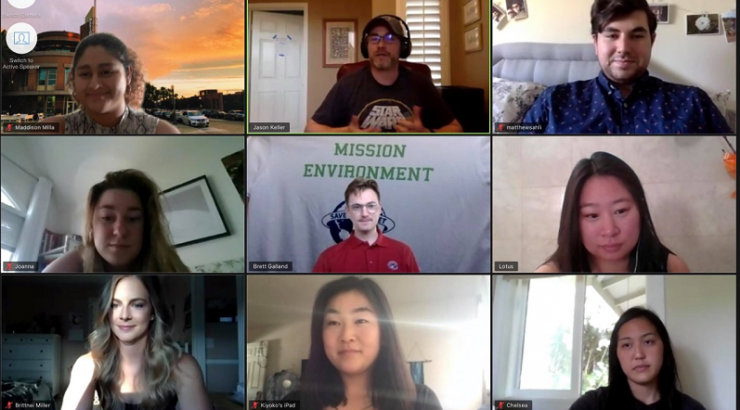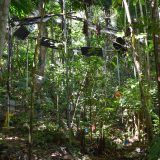
First-Ever ES&P Networking Mixer Brought Positivity During Pandemic Monroe Roush '21 shares her takeaways from the event
June 24, 2020

Environmental Science & Policy student Monroe Roush shares her takeaways from the ES&P Networking Mixer
I chose Chapman in part because of the Environmental Science and Policy (ES&P) program. I was attracted to the small class sizes, the passion of the students, and the professors I met when I was a prospective student. Now that I am a junior, I can confidently say that the major has far exceeded my expectations – and I know that my peers feel the same way. Not only do I love my classes and the professional opportunities I find through the program, but ES&P is truly a community.
On May 4, Dr. Jason Keller organized a Zoom happy hour for students and alumni to connect. Over 50 people joined the call, including 30+ alumni, 20+ students, and multiple faculty members. Participants divided into breakout rooms for about 10 minutes before reconvening as a group, and the process lasted for nearly an hour and a half. Many of us got to meet other students or alumni who we haven’t gotten to meet in the past, and we also had the chance to learn about the career paths of program graduates.
Joanna Falla, a current ES&P junior, said, “I really enjoyed seeing how close the ES&P community was. A lot of the alumni seemed to know each other well, and it was awesome to see how well Dr. Keller remembered and cared about everyone!”
A Versatile Degree
Other students shared Falla’s sentiment. Kate Hartshorn, a freshman from Denver, said, “It was really inspiring to see just how many careers ES&P can lead to. I also was reminded of how grateful I am to be a part of the ES&P family. It feels a bit cheesy to say, (maybe I’ll blame it on the year wrapping up), but being a part of a community like this, being afforded the opportunity to learn about topics ranging from plant-based meats to wetland ecology are why I wanted to pursue higher education. I’m also just so excited to learn about science?!!? Haha, it’s my first year, so I know I’m probably a bit glowy-eyed when I think of it now, but at the heart of what I’ve wanted in my educational experience, this is what I had hoped to find.”
ES&P is unique in part because it is such a versatile degree. Environmental science students are required to take courses in a number of different disciplines, including two semesters of chemistry, at least three policy courses, and at least one upper-division class in policy, ecology, and earth sciences. As a result, students are exposed to many different career paths and have the chance to connect with experts in many different fields during their time as an undergraduate. This course load makes it possible for some graduates to have a Ph.D. in ecology, work in corporate sustainability, or teach high school science.
The Start of a New Tradition
Alumni exchanged advice with current students and each other about the best ways to advance a career, decide when to go to grad school, and how to stay motivated working from home. Leah Thomas (‘17), a blogger and communications specialist at Patagonia, personally helped me brainstorm ways to assemble a writing portfolio to show potential employers. I’ve added many of my writing samples from various jobs to my LinkedIn, and am in the process of researching different ways to start a blog. Other grads helped current students brainstorm classes they could take this summer, or organizations with remote volunteer opportunities.
Especially now, it was incredibly uplifting to be in a “room” full of people with common interests and a love for ES&P. Dr. Keller said, “The first-ever ES&P networking mixer was amazing! It was so fun to see our students and alumni getting to know each other. I am so grateful for our alumni’s willingness to stay connected with this program and share their stories with our current students. I hope we just started a new tradition that will continue well past the current crisis.”
As many of us look to the future with uncertainty, the ES&P community is a helpful resource both for talking through alternative internships and for processing our emotions. Many students share common sentiments of disappointment about canceled plans, but the overwhelming mood throughout the Zoom meeting was one of resilience. The question most students are asking is “How do I continue to grow this summer?” I feel so fortunate to be part of a community with a positive attitude toward even the most difficult situations.

